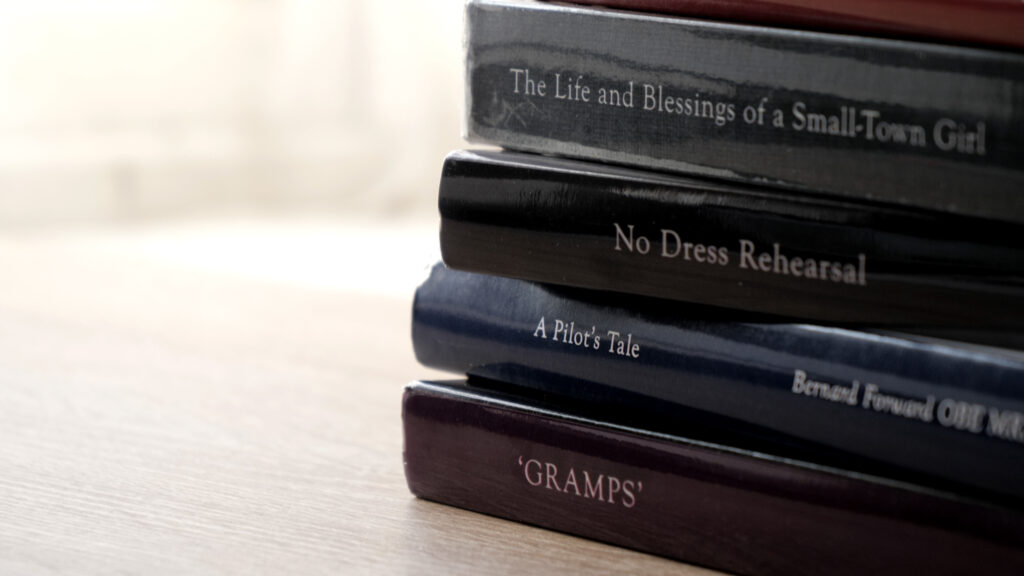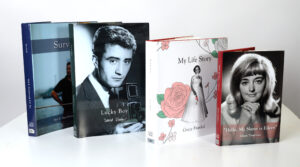“The act of recording your stories is a gift to your family and friends,
a way of saying ‘I was here, and my life mattered’.”
~ Maya Angelou, poet, memoirist, and activist
Do you ever feel an urge to write your life story but dismiss it as something that is only for the rich and famous? If so, you’re not alone.
The pull to capture and preserve the essence of our lives is something that many feel but few do anything about. We might doubt that our memories hold weight or significance or feel that our lives are somehow unworthy of being chronicled, or we might doubt our ability to pull off the seemingly epic task of writing an autobiography.
But here’s the thing: every life has value, regardless of how ordinary it might seem to the person who has lived it. Every life has lessons and memories that are worth sharing, and every story matters. What’s more, the experience of writing it all down can be deeply fulfilling, even when done just for yourself.
In this article, we explore the significance, motivations, challenges, and practical considerations of writing what is known as a “private autobiography”.
What is a private autobiography?
Private autobiographies are much the same as public ones. The narratives between their respective covers do the same jobs of recording and preserving life stories, exploring emotions and identities, and imparting knowledge.
The primary differences between public and private autobiographies lie in their purpose and their intended audience.
• Public autobiographies are produced with the intention of being published and read by a wide audience. They are often written (or ghostwritten) by people with a high public profile—think Me by Elton John, My Life by Bill Clinton, and Open by Andre Agassi.
The rationale behind a public autobiography is usually to share the personal and the professional aspects of the author’s life with the world, to entertain, inspire, and offer insights into their achievements and experiences.
• Private autobiographies, on the other hand, are crafted primarily for the author themselves, for a limited group of family members, friends, or colleagues, or for future generations.
Unlike their public counterparts, private autobiographies are usually written for more personal, introspective reasons. The author might simply want to reflect on their life and make sense of their experiences or to preserve their memories and personal history to pass down through the generations.
While both public and private autobiographies share the goal of documenting a person’s life story, the intended audience and purpose shape the different tones, content, and styles of each.
Why write a private autobiography?
The reasons why people write private autobiographies are as varied as the authors themselves.
The pursuit of self-discovery is a common motivation. Writing a private autobiography is an inherently introspective process that can be like taking a deep dive into the heart and mind. The process invites the author to make sense of the triumphs, challenges, and complexities of days gone by. It allows them to explore their thoughts and feelings, to identify lessons learned, and to reassess the most significant events of their life.
Writing a private autobiography can, therefore, be a form of therapy. Remembering past events, releasing pent-up emotions, processing traumatic experiences, and finding solace in the act of storytelling can lead to healing, self-compassion, and a more profound understanding of oneself. The writing process can also help to set goals and aspirations, to clarify values and priorities, and to identify areas for self-improvement.
People also write to express themselves. Private autobiographies are a creative outlet and a way to articulate thoughts, feelings, and experiences in one’s own words.
Writing a private autobiography is also, of course, a great way to capture and preserve the cherished memories and significant moments of one’s life. The laughter, the tears, the triumphs, and the tribulations … Documenting them ensures that they will never be forgotten, imbuing them with a sense of permanence and importance and perhaps instilling in the author a new sense of accomplishment.
Similarly, people are motivated to record their family histories and traditions. Many authors include at least some family history in their private autobiographies, so as to record and celebrate the lives of those who came before. In this way, private autobiographies can serve as anchors that ground future generations in their family history and heritage, connecting past, present, and future within a narrative thread and fostering a sense of continuity across the generations.
Aspiring private autobiography authors often document this information—historical, emotional, practical—in order to create a tangible artifact, a legacy. This idea of constructing and leaving a testament to one’s existence, a work that will speak volumes about who you are and what you stand for and act as a repository of your wisdom, is another common motivation. Not only does a private autobiography ensure that the author will be remembered long into the future, it will offer insight, inspiration, comfort, solace, and a sense of belonging to those who follow. When the author is gone, their autobiography will remain—a keepsake that future generations can cherish and turn to for insight into the lives and legacies of their ancestors.
Challenges and considerations
Writing a private autobiography can be a rewarding experience but one that is not without challenges and considerations.
A common concern of private autobiography authors is that in writing about their experiences and innermost thoughts, they will open themselves to scrutiny and judgment. Recalling the raw truths of life can give rise to difficult emotions, and this requires courage, even when an author is writing purely for themselves.
Privacy is another significant consideration. Private autobiographies are rarely intended for large audiences, but, even so, it is important to respect the privacy of the people who are named or implied in them. Treading carefully and steering clear of divulging details that compromise someone else’s personal boundaries or land them in hot water is essential.
It is also important for private autobiography authors to self-censor and weigh up the potential consequences of disclosing sensitive information about themselves and their lives. Forthrightness in recounting one’s experiences is important, of course, but there may be instances when the full truth could harm or cause distress to oneself or others. The balance between discretion and honesty is nuanced, and empathy is often called for.
Among the practical challenges faced by many authors are lack of time and inability to write. Life and responsibility can get in the way, the challenge of writing a book can feel overwhelming, and a lack of progress or quality in the writing can discourage even the most committed authors. Overcoming these obstacles requires perseverance, self-discipline, prioritization, and, potentially, outside assistance from a professional private autobiography company.
Examples and case studies
Authors of autobiographies, both public and private, have documented their lives in myriad ways, and wise indeed is the wannabe author who reviews what those people have done, in order to gain inspiration before starting their own projects. Books such as Maya Angelou’s I Know Why the Caged Bird Sings are inspiring testaments to the power of storytelling and its ability to resonate.
Some of the most famous public autobiographies started life more privately. Perhaps the most well-known of all, Anne Frank: The Diary of a Young Girl, is an intimate reflection on a life spent in hiding during World War II. Anne intended to rewrite her diary as a novel after the war, but events intervened. Her diary was published after her death, and it has gone on to touch hearts and minds around the world.
Journals, by Nirvana frontman Kurt Cobain, is another—and very different—example of private writing made public. A hard-hitting collection of excerpts from his personal diaries, the published book offers insights into Cobain’s thoughts, struggles, and creative processes.
Inspiration can also be found in less well-known autobiographies, publicly available but written by so-called “ordinary people”. These Poor Hands by B. L. Coombes, for example, is an evocative autobiography of a coal miner. Sisters of the Spirit, edited by William L. Andrews, is an inspiring compilation of autobiographies by pioneering Black women preachers in nineteenth-century America. Walter Murray’s Copsford is a beautiful memoir of a simple, solitary life in the English countryside.

Two of our wonderful LifeBook authors holding their private autobiographies.
Strictly private autobiographies are, by their very nature, difficult to cite here. LifeBook Memoirs is fortunate, however, in that a number of our authors have granted us permission to share insights into their books. Here are just a few:
• A Rollercoaster Life, by Martin Sterne
• Credit Where It’s Due, by Barbara Freedman
• I Just Grow’d (Like Topsy), by Pat Chrisfield
• I Should Have Been Born Twice, by Jimmy Russo
• Looking Back with Love, by Jeannette Meyers
• Reflections So Far, by Bob Forster
• The Life I’ve Built, by Tony Giddings
• What Happened to a Wartime Child, by John Evans
Tips for getting started
If you feel tempted to sit down and write a private autobiography of your own, the prospect might seem daunting, but with the right approach, mindset, and, perhaps, help, you can do it.
Here are some tips to get you started:
• Find a good space. Find somewhere peaceful and private, a place where you can focus, feel comfortable, and let your thoughts flow. Try surrounding yourself with mementos or objects that evoke memories and emotions.
• Prepare your thoughts. Begin journaling or keeping a diary. These humble tools are among the most valuable for aspiring private autobiographers. They provide safe spaces in which to pour out thoughts and experiences without fear of judgment or censorship. Whether you keep them as handwritten pages in your bedside drawer or as digital entries on your laptop, let your journals serve as repositories for your raw, unfiltered reflections that lay the foundations for deeper exploration.
• Plan your content. Give some thought, ahead of time, to what you want to cover. An autobiography that hones in on its themes and stories in a planned, structured way will almost always trump an unplanned, stream-of-consciousness effort. Sketch out a family tree and a timeline of key moments to help you pinpoint what you want to say.
• Define your objectives. Identify what you hope to accomplish, whether it’s to gain self-insight, heal from trauma, or leave a legacy for future generations. Having a clear sense of purpose will guide your writing journey.
• Nudge your memory. Prompts are a great way both to plan and kickstart the writing process. Prompts can range from simple questions about life events to abstract inquiries about values and beliefs. By responding to these prompts, you’ll uncover insights and unearth stories you have probably not thought about in years.
Prompts can also be audio or visual in nature. Photos, videos, and audio recordings can bring memories to life in vivid detail, evoking emotions that words alone cannot capture. By drawing on these multimedia elements and perhaps incorporating them into your narrative, you’ll be able to enrich your private autobiography with cues that resonate on a different level.
• Consider structure and style. Decide what structure and writing style you prefer. Do you, for instance, want to take your readers on a sequential, chronological walk through your life, or do you want to focus on certain aspects or themes? How formal do you want the tone to be? Chatty and irreverent or formal and polished? And how about format? Most private autobiography authors opt for traditional prose, but illustrated memoirs and audiovisual approaches allow for a more multidimensional portrayal of life.
• Schedule time. Carve out and ringfence regular time in which to write. Writing always takes more time than you expect, and daily responsibilities and distractions can impinge on your plans. Whether you schedule a few minutes each day or a longer block of time every week, consistency will be key to making progress.
• Hone your writing. Try writing exercises such as free writing and stream-of-consciousness writing to get your creative juices flowing and to loosen the grip of self-doubt and perfectionism. Sharing your writing with others can provide valuable feedback, encouragement, and accountability, so, as you progress, enlist the help of family, friends, mentors, and/or writing groups.
• Go easy on yourself. Writing a private autobiography can be a deeply personal and often emotional process. Be patient and compassionate with yourself as you navigate the inevitable ups and downs of self-reflection and storytelling.
• Seek assistance. Great writing—as distinct from just writing—demands a set of expressive and creative skills that only a lucky few possess. There should never be embarrassment in admitting this. After all, we all have our own unique strengths and limitations. If you recognize that you might struggle to put pen to paper, if you’re already juggling more balls than you can manage, or if you find that you’re unhappy with the results of your work, seek the help of a specialist private autobiography provider such as LifeBook Memoirs.
LifeBook Memoirs invented the term “private autobiography”, and the company’s professional ghostwriters and editors know how to create an elegant, engaging, or exciting manuscript. They can amplify your voice and help you to achieve your aims without compromising on quality or authenticity.
In the video below, Angel Alvarez discusses how the help of experts made it possible for his mother, Esperanza, to create a book about her life—something that she had not previously felt comfortable about doing.
Key points
Private autobiographies are crafted primarily for their authors or for a limited audience and are written for various reasons. These include personal growth, emotional healing, and the desires to record family or personal history and to leave a legacy for future generations.
Authors typically need to deal with challenges such as vulnerability, privacy, and time, but tools and techniques like journaling, prompting, and sourcing inspiration can facilitate the writing process.
Tips for getting started include setting aside dedicated time and space, preparing thoroughly, and seeking guidance and support from a professional private autobiography company.
Written by Steve Edwards, LifeBook Memoirs editor







